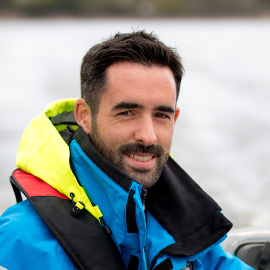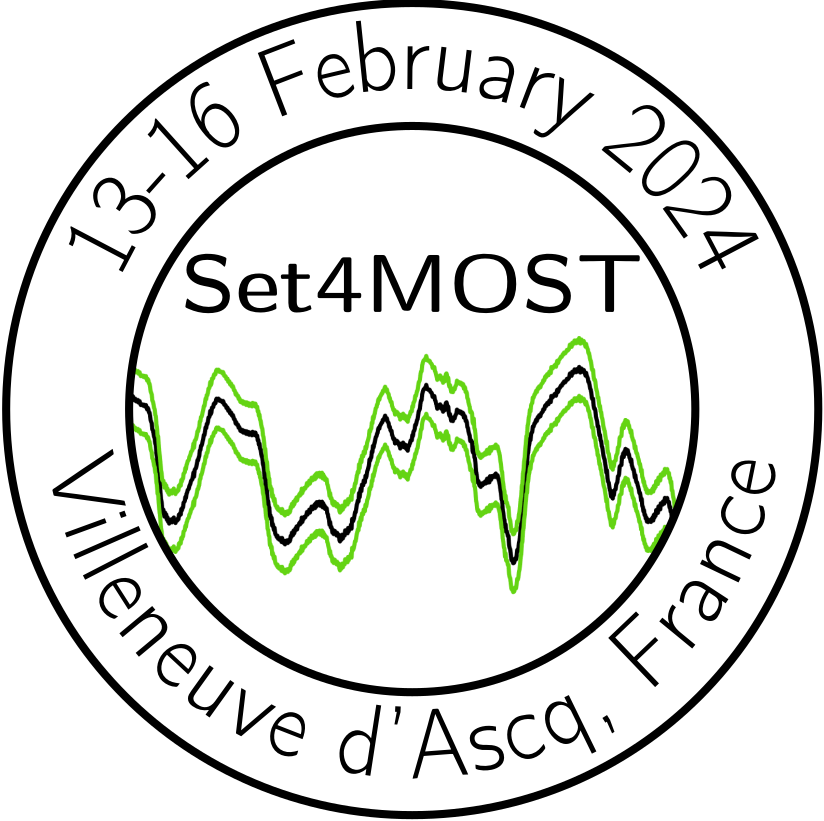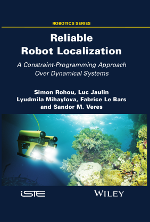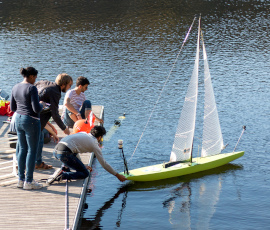Simon Rohou
33 y.o., Brest, France
Passionate about underwater robotics, I defended a Franco-British PhD thesis about localization methods for underwater robots with set-membership approaches. See more .
deal with dynamical systems using constraint programming approaches . I performed a postdoctoral research on this topic at IMT Atlantique /LS2N (Nantes, France).
ENSTA Bretagne (Brest, France) and member of the Robex team in the research laboratory Lab-STICC .
Marine working group of the French national Research Group in Robotics (GdR) established by the CNRS . See more .
Links:
GoogleScholar , ResearchGate , HAL , arXiv , GitHub , YouTube , ENSTA Bretagne
Academic publications
Exhaustive interval-based 2-D shape registration under similarity transformation
Verlein Radwan , Simon Rohou Gilles Trombettoni
In progress.
Set-membership terrain-based navigation
Simon Rohou
Submitted.
Natural efficient gaits from Nonholonomic Locomotion Nonlinear Normal Mode (NL-NNM): The Pendrivencar case
Mirado Rajaomarosata , Luc Jaulin , Lionel Lapierre , Simon Rohou
Published in Mechatronics , 2025.
Offline and online use of interval and set-based approaches for control and state estimation: a review of methodological approaches and their application
Andreas Rauh , Marit Lahme , Simon Rohou Luc Jaulin , Thach N. Dinh , Tarek Raïssi , Mohamed Fnadi
Published in Logical Methods in Computer Science , 2025.
Bibtex .
The Codac library: a Catalog Of Domains And Contractors
Simon Rohou Benoît Desrochers , Fabrice Le Bars
Published in Acta Cybernetica - Special Issue of SWIM 2022 , 2024.
■ Download preprint . Bibtex .
Experimental validation of an ellipsoidal state estimation procedure for a magnetic levitation system
Andreas Rauh , Jonas Soueidan , Simon Rohou Luc Jaulin
Published in International Federation of Automatic Control 2023 , 2023.
■ Download preprint . Bibtex . Video .
Brunovsky decomposition for dynamic interval localization
Simon Rohou Luc Jaulin
Published in IEEE Transactions on Automatic Control , 2023.
■ Download preprint . Bibtex . More .
Lie symmetries applied to interval integration
Julien Damers , Luc Jaulin , Simon Rohou
Published in Automatica , 2022.
■ Download preprint . Bibtex . More .
Proving feasibility of a docking mission : a contractor programming approach
Auguste Bourgois , Simon Rohou Luc Jaulin , Andreas Rauh
Published in MDPI , 2022.
■ Download paper . Bibtex .
An online interval-based inertial navigation system for control purposes of autonomous boats
Fabrice Le Bars , Robin Sanchez , Luc Jaulin , Simon Rohou Andreas Rauh
Published in Frontiers In Control Engineering , 2022.
■ Download paper . Bibtex .
An ellipsoidal predictor-corrector state estimation scheme for linear continuous-time systems with bounded parameters and bounded measurement errors
Andreas Rauh , Simon Rohou Luc Jaulin
Published in Frontiers In Control Engineering , 2022.
■ Download paper . Bibtex .
Exact bounded-error continuous-time linear state estimator
Simon Rohou Luc Jaulin
Published in Systems & Control Letters , 2021.
■ Download preprint . Slides . Bibtex . More .
Towards a generic interval solver for differential-algebraic CSP
Simon Rohou Abderahmane Bedouhene , Gilles Chabert , Alexandre Goldsztejn , Luc Jaulin , Bertrand Neveu , Victor Reyes , Gilles Trombettoni
Published in CP (International Conference on Principles and Practice of Constraint Programming) , 2020.
■ Download preprint . Bibtex . More . Video .
Set-membership state estimation by solving data association
Simon Rohou Benoît Desrochers , Luc Jaulin
Published in IEEE International Conference on Robotics and Automation (ICRA) , 2020.
■ Download preprint . Bibtex . More . Video .
Reliable robot localization: a constraint-programming approach over dynamical systems
Simon Rohou Luc Jaulin , Lyudmila Mihaylova , Fabrice Le Bars , Sandor M. Veres
Book published at ISTE Group , 2019.
■ Download table of contents . Bibtex . ★
Proving the existence of loops in robot trajectories
Simon Rohou Peter Franek , Clément Aubry , Luc Jaulin
Published in The International Journal of Robotics Research , 2018.
■ Download preprint . Bibtex . More .
Reliable non-linear state estimation involving time uncertainties
Simon Rohou Luc Jaulin , Lyudmila Mihaylova , Fabrice Le Bars , Sandor M. Veres
Published in Automatica , 2018.
■ Download preprint . Bibtex . More .
Guaranteed computation of robot trajectories
Simon Rohou Luc Jaulin , Lyudmila Mihaylova , Fabrice Le Bars , Sandor M. Veres
Published in Robotics and Autonomous Systems , 2017.
■ Download preprint . Bibtex . More . ★
Interval Winter School
Modelling, Estimation, and Control using Set-Based Methods: Theory and Applications Date: 13th February - 16nd February 2024 Organizers: Sara Ifqir, Andreas Rauh, Simon Rohou
See the winter school website
PhD thesis on mobile robotics
Subject: Reliable robot localization: a constraint-programming approach over dynamical systems
Joint PhD between:
ENSTA Bretagne /Lab-STICC (France),
The University of Sheffield (England)
Funding: Direction Générale de l'Armement (DGA , France)
Monday, 11 December 2017 .
Update (November 2019): the thesis has been published as a book at ISTE Group Download the manuscript of the thesis (Bibtex )
Download the table of contents of the book
Download the thesis reports
Download the slides
Download the acknowledgements
★ Award of the best PhD thesis in 2017 by the French research community in robotics CNRS headquarters (Paris):VIDEO
PhD students
Damien Esnault
Topic: Terrain-based navigation of an underwater robot with low-cost sensors for approaching dangerous targets
Dates: September 2023 - September 2026
Co-supervised by: Luc Jaulin (25%), Simon Rohou (25%), Fabrice Le Bars (25%), Fabien Novella (25%)
Funding: DGA TN Brest, DN-GDM/LCM
Mirado Rajaomarosata
Verlein Radwan
Topic: Interval methods, dynamical systems and guaranteed trajectories for robotics and karstic exploration
Dates: October 2020 - October 2023
Co-supervised by: Gilles Trombettoni (40%), Simon Rohou (40%), Lionel Lapierre (20%)
Funding: Région Occitanie, Université de Montpellier
Julien Damers
French national marine research group (GDR/CNRS)
Marine working group of the French national Research Group in Robotics (GdR) established by the CNRS .
Popular science
Underwater exploration techniques : history and innovations.
October 2019: A flip-flops conference given during the Festival Baie des Sciences at Saint-Brieuc (France). VIDEO
Talks
30/06/2025
SWIM 2025
(Rennes, France)
Reliable SLAM in ambiguous environments.
Abstract . Slides .
23/06/2025
(invited keynote) Dynamics, Topology and Computations (DyToComp 2025)
(Będlewo, Poland)
Reliable localization of an underwater robot based on tubes and topological degree.
Abstract . Slides .
11/06/2024
Validation of drones and swarms of autonomous drones
(Palaiseau, France)
An aymptotic minimal contractor for non-linear equations provided in the Codac library.
Slides .
06/06/2024
SWIM 2024
(Maastricht, The Netherlands)
An aymptotic minimal contractor for non-linear equations using the Codac library.
Abstract . Slides .
15/12/2023
Journée GT2 Robotique Marine/Sous-marine
(Paris, France)
Reliable underwater SLAM using seabed roughness.
Slides .
19/10/2023
JNRR 2023
(Moliets, France)
Tutorial about Constraint programming for robotics.
Abstract . Slides .
27/06/2023
SWIM 2023
(Angers, France)
Brunovsky decomposition for dynamic interval localization.
Abstract . Slides .
18/04/2023
Validation of drones and swarms of autonomous drones
(Paris, France)
Brunovsky decomposition for dynamic interval localization.
Slides .
22/11/2022
Validation of drones and swarms of autonomous drones
(Paris, France)
Exact bounded-error continuous-time linear state estimator.
Slides .
22/07/2022
SWIM 2022
(Hannover, Germany)
The Codac library.
Abstract . Slides .
15/03/2022
Validation of drones and swarms of autonomous drones
(Paris, France)
Set-membership Terrain Based Navigation, example of use of the Codac library.
Slides .
02/07/2021
Interval Online Seminar
(virtual)
Interval State Estimation by Solving Data Association.
Slides .
04/02/2021
Virtual round tables, Ifremer
(virtual)
Single and multi-machine reliability and decisioning strategy, Artificial Intelligence.
31/05/2020
ICRA 2020
(virtual)
Set-membership state estimation by solving data association.
Slides . Video .
29/05/2020
Talk in front of the Minister of the Armed Forces
(Brest, France)
Presentation of research topics related to marine robotics.
Video .
22/01/2020
ANR Contredo meeting
(Marne-la-Vallée, France)
Set-membership state estimation by solving data association.
Slides . Video .
02/12/2019
Teaching intervention at École Centrale
(Nantes, France)
Constraint programming for mobile robotics.
Slides . Video .
08/11/2019
Validation of drones and swarms of autonomous drones
(Paris, France)
Contractor programming for mobile robotics.
Slides . Video .
16/10/2019
(keynote speech) National Days of Robotics Research
(Vittel, France)
Set-membership methods for mobile robotics.
Slides . Video .
12/10/2019
Vulgarisation scientifique au festival Baie des Sciences
(Saint-Brieuc, France)
Techniques d'exploration sous-marine : Histoire et innovations.
Slides . Video .
26/07/2019
SWIM 2019
(Palaiseau, France)
Verifying loops in robot trajectories under uncertainties.
Abstract . Slides .
28/06/2019
French underwater/marine robotics day
(Paris, France)
Set-membership terrain based navigation.
Slides . Video .
21/06/2019
National Days of Robotics Teaching
(Toulouse, France)
Robotics and hydrographer engineers explore the Guerlédan lake.
Abstract . Slides .
26/04/2019
LS2N seminar
(Nantes, France)
Set-membership terrain based navigation.
Slides . Video .
23/04/2019
IBEX days
(Nantes, France)
The Tubex library.
Slides .
03/12/2018
(invited keynote) IEEE OES Conference, USYS’18
(Wuhan, China)
Localizing underwater robots with a new bathymetric SLAM approach.
Slides .
22/11/2018
★ Best Thesis Award (GdR Robotique)
(Paris, France)
Presentation of the thesis during the French Robotics Workshop.
Slides . Video .
16/11/2018
JAMACS 2018
(Nantes, France)
Verifying loops in robot trajectories under uncertainties.
Slides .
12/09/2018
SCAN 2018
(Tokyo, Japan)
Dealing with evaluation constraints in uncertain dynamical systems.
Abstract . Slides .
27/07/2018
SWIM 2018
(Rostock, Germany)
Reliable propagation of time uncertainties in dynamical systems.
Abstract . Slides .
12/07/2018
OGRE seminar
(Nantes, France)
Reliable propagation of time uncertainties in dynamical systems.
Slides .
05/04/2018
LS2N seminar
(Nantes, France)
A temporal approach for the SLAM problem.
Slides .
26/01/2018
PhD thesis presentation
(Sheffield, UK)
Reliable robot localization: a constraint programming approach over dynamical systems.
Abstract . Slides .
11/12/2017
PhD thesis defence
(Brest, France)
Reliable robot localization: a constraint programming approach over dynamical systems.
Abstract . Slides .
06/07/2017
IST-Austria Seminar
(Wien, Austria)
Topological degree theory for loop proof purposes.
Slides .
30/06/2017
Talk at IMT Atlantique
(Nantes, France)
Reliable loop-based localization in very poor environments.
Slides .
03/03/2017
ANR Contredo - kickoff
(Montpellier, France)
Contractor programming over trajectories.
Slides .
07/02/2017
TOMS Seminar
(Brest, France)
A reliable way to compute robot trajectories.
Slides .
17/01/2017
DSTL visit
(Porton Down, UK)
Tube programming applied to underwater localization.
Slides .
26/09/2016
SCAN 2016
(Uppsala, Sweden)
Tube programming applied to state estimation.
Abstract . Slides .
30/06/2016
SHARC 2016
(Brest, France)
An overview of the MOOS-IvP middleware.
Abstract . Slides .
28/06/2016
Dependability of Complex Robotic Systems
(Brest, France)
Guaranteed computation of robots trajectories.
Slides .
24/06/2016
PRASYS Seminar
(Brest, France)
Collaborative localization over the seabed: a Walking Strategy.
Slides .
09/03/2016
GdR Robotique
(Montpellier, France)
Wide underwater area exploration with autonomous vehicles: a Walking Strategy.
Slides .
16/07/2015
OSM Seminar
(Brest, France)
Robot localization in an unknown but symmetric environment.
Slides .
10/06/2015
SWIM 2015
(Praha, Czech Republic)
Robot localization in an unknown but symmetric environment.
Abstract . Slides .
Guerlédan project
Guerlédan Project autonomous robots , hydrographic sensors and nautical resources deployed in such complex environment .
Software
I am developing the Codac library : a C++ project providing tools to guarantee computations over sets of trajectories.the official webpage
Consortium
Contredo project (ANR ), that gathers several academic and industrial partners with the aim of designing a software tool based on intervals to handle dynamical systems.
Contact
Office M026
Send-me a message

 From 2020 to 2025, I was in charge of the Marine working group of the French national Research Group in Robotics (GdR) established by the CNRS. See more.
From 2020 to 2025, I was in charge of the Marine working group of the French national Research Group in Robotics (GdR) established by the CNRS. See more. 


 The objective of this winter school is to provide a comprehensive introduction to set-based methods, particularly interval-based approaches, spanning from theoretical foundations to their applications in various problem domains such as parameter identification, state estimation, and robust control.
The objective of this winter school is to provide a comprehensive introduction to set-based methods, particularly interval-based approaches, spanning from theoretical foundations to their applications in various problem domains such as parameter identification, state estimation, and robust control.

 I am in charge of the
I am in charge of the  Member of the Contredo project (
Member of the Contredo project (